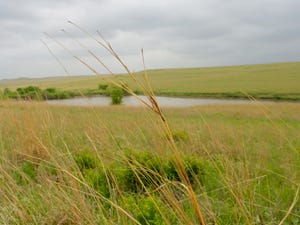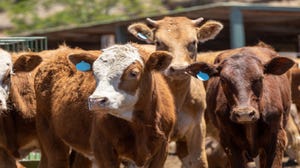Science Matters addresses the need for enhanced STEM education and growing a STEM workforce by fostering a love of scientific exploration in students across urban and rural areas around the country.
April 24, 2018

My youngest sister Kaley will be graduating from South Dakota State University in a few weeks. With a degree in agricultural business, she’s excited to have secured a position at an agricultural bank, and she’s looking forward to working with farmers and ranchers in reviewing loan applications and creating a game plan that will keep their balance sheets in check.
Agricultural business is just one of the career fields that offers an abundance of opportunities for young people. I’ve written about this topic previously, but I think it’s worth repeating—according to the USDA, there will be 57,900 jobs available in the fields of food, agriculture, renewable resources and the environment and just 35,400 students with expertise to fill those positions.
While agriculture may not be taught in all schools, the things producers need to know to get food from pasture to plate are the very same core lessons that are reinforced and applied in STEM classes (Science, Technology, Engineering and Mathematics).
Farm kids are lucky to be taught STEM from a very young age. Calculating feed rations, repairing and maintaining farm equipment, utilizing apps, drones, genetics and the latest technologies in breeding cattle or raising crops, or building and welding fencing or facilities from scratch — the tasks that we often must complete on the ranch are based on the core principles of STEM.
READ: Bayer & 4-H want more agri-science lessons in schools
That’s why agricultural education in schools is so important and why it’s so frustrating that educators don’t always have the resources and support to implement these lessons in the classroom.
It’s for this reason that I’m such a strong proponent of what Bayer and the National 4-H Council are trying to accomplish. With a program called Science Matters, the two groups have teamed up to grow the workforce in these agricultural fields by fostering a love of STEM in the classroom.
Word is spreading about this effort. In fact, an article featured in Teen Vogue titled, “Does science matter? These inspirational women certainly think so,” highlights the up and comers in agriculture who are using STEM to make a difference and provide food for a growing planet.
Here’s an excerpt from the article: “We spoke to girls who inspire us, who are already bringing innovation to the field of agri-science: Serena Woodard, Abbey Schiefelben, Abril Delgado, Anushka Ramgounda, and Anna Gomes. And we’re 100% sure they’re going to change the world.”
The article details Woodard’s leadership workshops that provide youth with information on caring for livestock, beekeeping techniques and gardening. Her program has expanded to 36 counties and has reached 40,000 kids.
READ: Recognizing outstanding agricultural educators
Schiefelben hopes to become a food scientist one day, but has recently utilized her love of science to create technology that can track cattle on the range.
Delgado is working to change the stigma behind agricultural careers. She says many of her peers think agriculture is just about cows and plows, but in reality, it’s an interdisciplinary field that “connects us all together.”
She said, “Youth can and will change the world as we know it, everything from agricultural policy to the soil that grows our food. Youth will be the driving force and inspiration for the change and advancements that we will have in the future.”
Meanwhile, Ramgounda is working to revive a local community garden to help provide fresh fruits and vegetables to local homeless shelters.
And finally, Gomes is striving to reduce food waste and food insecurity through the sales of fresh “ugly” produce with a unique and innovative product line that transforms “wasted” food into delicious products.
READ: Bayer & 4-H invest in future science leaders
You can read more about these young agricultural professionals here.
Again, I can’t praise 4-H and Bayer enough for the Science Matters program. The program is encouraging students to apply lessons learned in STEM classes to real-life scenarios found in the agricultural industry, and it’s bringing to light the many career opportunities that are available to young people today.
If we are to feed a growing and hungry planet, agricultural education will be paramount, but it’s up to us to ensure that these lessons make their way into the classroom and that students and teachers have the support and resources they need to fully explore these areas of study.
The opinions of Amanda Radke are not necessarily those of beefmagazine.com or Farm Progress.
About the Author(s)
You May Also Like





